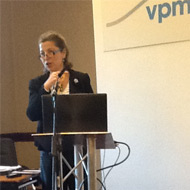Know your customer

Jane Fletcher
'We probably know our four legged customers better than our two legged ones', was Jane Fletcher's comment at the beginning of her lecture on how to know your customers.
Jane concentrated on the three stage client journey:-
Stage 1 before the visit
Stage 2 during the visit
Stage 3 after the visit
We tend to look mostly at stage two when we consider the client experience but in fact there is a great deal 'going on' before and after the actual visit to the vet.
Jane based her talk on work done with Beech House Veterinary Centre and looked at some of the basic things that clients experienced before visiting the vet, such as getting the cat into the basket, dealing with a nervous dog that does not like going to the vet, the possible difficulty of parking or getting an appointment at a convenient time. These are all things that influence the client's attitude to the vet and it is these experiences that can greatly influence their decision to visit their veterinary surgery more than the minimum number of times necessary.
Having completed the visit the experience/journey is not over. Clients are left with various emotions such as, did they get value for money, was the overall experience good or bad for both them and their pet, were they helped and valued as much as they would here liked?
It is these two parts of the client journey that Jane said practices need to find out about from clients so that they can help to make their customers' lives easier and bond them to the practice. The veterinary client needs both emotional and practical support from the veterinary practice, they need to be listened to supported and valued but at the same time offered the practical help and advice on how to do things,if only just how to get their cat into it's basket with the minimum of stress for both them and their pet.
It is this extra understanding of what clients need that can make the difference to good client care and retaining them in the practice.



 The Veterinary Medicines Directorate (VMD) is inviting applications from veterinary students to attend a one-week extramural studies (EMS) placement in July 2026.
The Veterinary Medicines Directorate (VMD) is inviting applications from veterinary students to attend a one-week extramural studies (EMS) placement in July 2026.